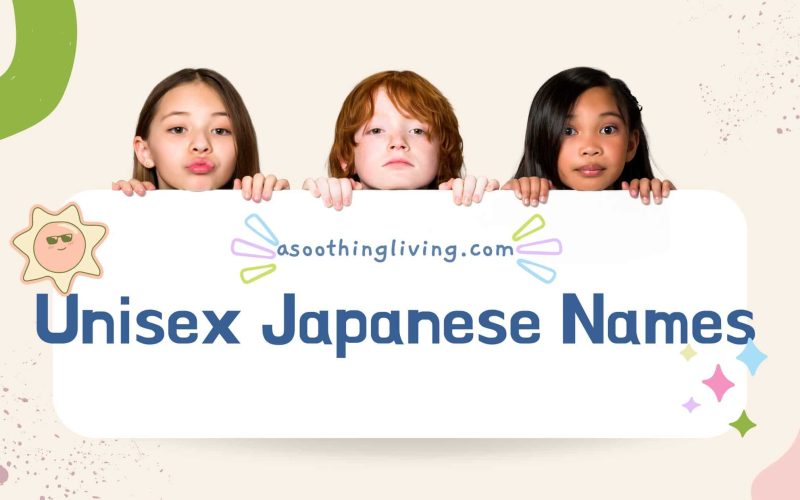Japan has some unisex names that are incredibly popular, and there are even official lists of unisex names—given by the Japanese government to new parents.
This article will look at the top unisex Japanese names, their meanings, and pronunciations in English. Unisex names are also popular in many other countries.
So this list could be handy if you have friends or family members expecting children shortly!
Yusuke
Based on an independent survey of 1,200 respondents in 2015. Yusuke was chosen as one of the top 10 unisex Japanese names that both men and women liked. The name means complete, but it is also translated as good fortune.
However, Yusuke Urameshi from YuYu Hakusho popularized it in anime, where he served as a hero. He has a rough exterior but possesses great kindness and faithfulness to those around him.
Nowadays, many people know him as Kurama. From Togashi’s later work—the manga named for its immortal main character—where he stars alongside Toru Rikishi. Another renowned unisex name.
Misaki
Misaki is a trendy girl’s name in Japan but is also among unisex Japanese names. Misaki has an unexpected meaning—a beautiful fragrance.
You may want to consider one of these since you’re naming your child after a person. A few famous Misakis include Masami Sorayama (artist), Rieko Miura (actress), and Yuki Kato (player for the women’s soccer team). And Kenichi Mikawa (male singer).
Kazuya
This name has a popularity rank of #75 (coed) in Japan. It is given to 0.07% of male babies born there and is also among unisex Japanese names.
Furthermore, Kazuya is pronounced Kah-zoo-yah. The name originates from Hindu and means Holder of wealth or Wealth’s descendant.
Shiori
This name has a popularity rank of #546 (unisex) in Japan. It is given to 0.00132% of female babies born there and is also among unisex Japanese names.
Haruka
Haruka means both spring and far away. As a name, it has been famous for girls and boys alike since at least 1985.
Although its use as a male name remains more popular in Japan than abroad, Haruka has made headway on the list of unisex Japanese names chosen internationally in recent years. It’s currently ranked #181 in popularity with girls overall but is also widely used for boys.
In America, Haruka is generally given to girls. Even in 2013, there were almost 30 newborn American Harukas that year. Who went home with their proud parents named for springtime.
Natsuki
Natsuki can be written in many ways, but it is most commonly reported using kanji and hiragana. Natsuki is a place name that means beach or bay. It is also used as a name in popular culture and media such as anime, manga, and video games.
Many characters in popular media are named Natsuki. Including Pokemon characters.
However, Natsuki also belongs to unisex Japanese names. Yuki (snow) will probably always feel like a girl’s name. Just because of how soft and gentle it sounds.
More so, I’m sure someone has told you about feminine personality traits before. It is being linked to names!
Riku
Riku is a typical Japanese name that’s pronounced like Ryan in English. It means land and has no particular gender connotation. As a result, it has a perfect place among unisex Japanese names.
So, if you’re looking for something similar to Ryan but with a minor edge, Riku might be perfect for your new baby boy or girl. You can use many cute nicknames for both genders, including Riki and Riko.
Shizuka
Shizuka also belongs to a unisex Japanese name, quiet or calm. Shizuka is very rare in Japan as a girl’s name, with only five occurrences per 100,000 people. It isn’t among the top 1000 names for girls in Japan.
Unlike if you are searching for Shizuka as a boy’s name. It ranks #538 out of over 80,000 male baby names in Japan. In both cases, Shizuka is used more often by parents outside Japan.
Botan
For centuries, Botan has been considered a feminine name in Japan. However, between 2014 and 2015, it became much more popular for males than females.
Whether that’s an indication of a new trend or just a quirk of Japan’s changing demographics is anyone’s guess, but one thing is clear. Naming him after Bonsai is a brilliant idea if you have a son since it’s among unisex Japanese names.
Hiroto
If you’re looking for the best unisex Japanese names, Hiroto is among them. It’s a popular baby name in Japan. Hiroto was among the top 100 most popular boys in 2007 and 2008.
In addition to being unisex, it also works excellent with western last names as a surname. Parents outside of Japan appreciate its connection to American actor Hugh Laurie (who played Dr. Gregory House on TV). Surprisingly, a typical Japanese name like Hiroto doesn’t pop up more often!
Fuji
Using a name like Fuji for boys or girls is a great way to celebrate your heritage and culture, especially if you have parents born in Japan.
Moreover, Fuji has come out of nowhere to become one of the most popular unisex Japanese names in America. And it’s easy to see why. The ever-present and stunning Mount Fuji stands tall above Japan, reminding everyone of their rich history, culture, and pride.
However, having any child named after Mount Fuji is excellent because it’s sure to be an honor!
Kaito
It has a charming feel and is still pleasing to look at. It’s said that Kaito is among popular unisex Japanese names, but currently, it seems more prevalent among boys. Kaito also means a gorgeous child or wonderful music, so it’s an appealing name overall.
In addition, it’s most common meaning when written as a girl’s name is a pure child. While its ordinary meaning, when written as a boy’s name, is a pleasing sound.
Jiro
One of many traditionally masculine names that you don’t see very often in Japan, Jiro can be a little confusing. In its original form, it means encouraging field – and sometimes prosperous or blessed.
This makes sense when you consider that Jiro is actually a title and also belongs to unisex Japanese names.
In addition, the full name would read as Jiro Yoshitaka, which would mean Successful Son of Yoshitaka. Not so encouraging, after all!
Kenji
Kenji is a popular boy’s name in Japan. In fact, according to 2014 survey results. It was one of three names appearing on almost every list of most popular boys’ names in Tokyo.
But why is Kenji not expected as a unisex name? One possible reason is that there aren’t many other Kenjis out there. As many do not know, it’s among unisex Japanese names.
Ren
This one of the popular unisex Japanese names comes from a combination of gentle and benevolent words. It was in use as early as 644 AD. And is on its way to becoming one of Japan’s most popular names for baby boys.
It ranked #2 in 2014, with over 1,000 babies born that year. The word ren can also be used as an adjective meaning truthful or sincere.
In addition to being used as a first name by itself. It can also be combined with other kanji characters to create new words. Such as Renko (meaning spring) or Renya (meaning beautiful).
Riku
Riku is popular among unisex Japanese names, meaning it can be used for both boys and girls. Riku means land in Japanese. And there’s some evidence to suggest that it might have originally been a masculine name.
Besides, this could be because of its kanji characters; on their own, they’re read as Ri-Ku. But when combined (as they would be in Riku), they make up an expression usually associated with men: (Riku shuku).
However, in recent years, there’s been a surge in popularity of using Riku as a girl’s name. So if you want your daughter to stand out from others with feminine names like Hikari or Yui, then Riku might just fit the bill.
Souta
The name Souta has traditionally been given to a boy. But in 2014, it was one of the most popular unisex Japanese names for babies. The characters for Souta mean noisy and light rain.
Also, the name brings to mind an image of a small child. I am making it perfect for parents looking for more unique characters that still sound cute.
Moreover, boys will be boys, and girls will be girls. But parents looking for something unisex can’t go wrong with Souta as one of their top choices.
Aoki
Aoki means blue tree. Aoki is not only among unisex Japanese names but also one of Japan’s most famous names.
It was ranked #1 in 2007. This is truly a beautiful name that is appropriate for any gender. Yet, it remains traditional and sophisticated at the same time.
Sana
Meaning blossom or innocence in Arabic, Sana is also among native unisex Japanese names. The Japanese don’t commonly give names based on nature but choose from a list of more than 1,000 classics.
But Sana may be on its way to becoming a popular girl’s name. It ranked at No. 135 for girls in 2014 and moved to No. 83 in 2017.
Though not quite as trendy, Sana is seeing similar popularity among boys (ranking No. 123). In Arabic-speaking countries such as Morocco and Tunisia, Sania is a boy’s name too!
Touma
Touma is a gender-neutral name meaning tower. It appropriately belongs to unisex Japanese names and has been used by more girls than boys over history.
For example, two different shoguns (military leaders) have carried it. Both ended up as villains in anime series: one was a school uniform-obsessed villain in Gakuen Alice. At the same time, another was an assassin who liked to wear her hair short in Sword Art Online II.
Most recently, Touma was also used by a young lady with blue hair. Who likes to punch giant monsters in My Hero Academia.
Goro
This part of unisex Japanese names is technically a male name. Goro is used in both Western and Eastern cultures. Variations of Goro include Gooru, Goroh, Goron, Gol, and Joropo.
But, for girls, it’s spelled Guriko or more commonly written as Kuriko. Both spellings will depend on where you live in Japan. Or where you happen to be at that moment if you’re traveling around.
In addition, the names are almost always pronounced Go-roo. But it can also sometimes be heard with an accent mark over the “o,” which changes its pronunciation to Go ̄-roo.
Chimon
Simon was traditionally a male name in Japan but later considered as part of unisex Japanese names. It ranked 3,965th out of 5,000 words given to boys in 2006. But when you look at its etymology, you’ll see that it is derived from a female name: Keemun.
Furthermore, Kei can mean to shine or splendor. And mun is short for young, which means bright or beautiful.
Therefore, Chimon means bright splendor, so how could Chimon possibly be used as a unisex name? We break it down further (remembering that one kanji can have multiple readings). We get kye-moe-n, an English pronunciation so close to that of Kevin!
Hotaru
Hotaru can be either a feminine or unisex name, depending on which kanji characters are used to write it. The kanji means firefly. And it’s believed that when women wear Hotaru, they’re said to have beauty like that of a firefly.
While men wearing Hotaru are said to be as powerful as a firefly. The popularity of unisex Japanese names has led more people to use both kanji for Hotaru.
This name is famous for girls, but it’s falling out of favor for boys. Because of its association with women, unisex names would be good alternatives.
Kota
Kota is a name both boys and girls in Japan use. Kota has an old-fashioned, very masculine feel but works just as well for either gender.
Nevertheless, it means lots of treasure. It makes for a great name, whether you have a little boy or girl.
Also, Koto or Ko as unisex Japanese names can be used for boys or girls. But people with babies who haven’t chosen their child’s sex yet are often preferred.
In addition, there’s a cute story about how it became popular. There was a monk named Master Kobo Daishi (or Kokai) who lived during the Heian period.
Oda
Oda is one of those lovely old-fashioned names that we see pop up in a few places lately. Where once it was considered a man’s name, people are now starting to see Oda as totally unisex. And we love it!
However, this one of the unisex Japanese names means significant stream or big river, which has an exciting meaning when you look at it from a cultural perspective—namely. Oda could be translated to mean grandmother.
In other words, even if you call your child Oda today, they’ll be Grandma Oda someday. The fun part about naming your baby after a body of water is that. As they grow up, their middle name might make more sense to everyone.
Hideo
With a name like Hideo, you can go either male or female, whether you’re naming your child or creating a solid brand identity for your startup. Hideo is one of many unisex Japanese names that work for both men and women.
The name itself means star picture, and its meaning certainly resonates with modern parents hoping to honor their ancestry. While breaking from tradition.
However, its popularity has remained steady in Japan over time. Particularly among families looking to honor deceased family members.
Katana
As part of unisex Japanese names, Katana ranked #1 in 2009 and has continued to be popular until today. The meaning of Katana comes from Sword in Japanese.
However, many parents choose names with multiple meanings for different sexes, such as James, which means grace for a girl but supplanter for a boy. So, it seems like Katana was truly made to fit all genders!
According to Nameberry, Katana is on its list of names that will likely become more popular over time. Due to current trends in baby-naming and cultural diversity. This could make it an excellent choice for you, especially if you want a name that stands out!
Yoshi
One of the most well-known unisex Japanese names is Yoshi, which means good fortune and happiness. It’s a trendy name for couples who aren’t planning to have a big family since it can be given to both boys and girls.
Interestingly, ‘Yoshi’ was once commonly used as an abbreviation for Yoshida or Yoshihito. Two common surnames in Japan are now quite rare.
Besides, the famous Yoshi brand of video games also draws its name from an abbreviated form of Yoshino. They are making ‘Yoshi’ an option for any child looking to incorporate a famous (and adorable) fictional character into their name!
Nori
Nori means seaweed. The name can be a boy’s or girl’s name, though it is more commonly used for boys.
It first became popular in 2004 but has become even more popular recently. And is one of the most common names for girls in Tokyo.
Notedly, Nori means entertainment as a part of unisex Japanese names. And though it may seem strange to use it as a boy’s name. It is used often throughout Japan nowadays.
Kumi
Despite being a female name, Kumi can also be used as a unisex name. It’s believed that Kumi was derived from Kumiko (Kumiko means shining child).
Additionally, many names derived from animals and plants in Japan are also among unisex Japanese names. If you think your baby will grow up to be tall, consider naming them either Taka or Sachi. The translation of these names means tall and beautiful, respectively.
Speaking of birds, Ko is another popular name that means small bird in English. But is known as unisex in Japan. This could be excellent for parents who want their kids to stand out at school!
Miu
A unisex name, Miu is a pretty name that sounds great in just about any language. It was ranked as one of 2016’s most popular unisex Japanese names.
Moreover, the meaning of Miu is honey or sweetness, which fits well with its ranking. In case you didn’t know, check out our post on traditionally male names for baby girls. For other excellent variations!
Ayaka
Ayaka is among popular unisex Japanese names. It ranked within the top 50 names given to both sexes in 2010. According to Japan’s Ministry of Health, Labor and Welfare.
While it isn’t a traditional unisex name, Ayaka could be used by either gender in modern times. Suppose you’re searching for an uncommon but modern-sounding unisex name. Consider giving your baby girl or boy a spin on Ayaka.
Hayami
One kanji combined with Hayami comes from an old Chinese word meaning earthen palace, mound, or life. Together they mean something like a small settlement on top of a hill or knoll.
The character is often written with an additional character, which can be pronounced as Hayashi. Moreover, this is a common surname in Japan.
Since it has two different pronunciations and doesn’t have any deep meanings, it makes for an excellent part of unisex Japanese names.
Asuka
The name Asuka is a girl’s name in Japan. Asuka was born out of wedlock, and her adoptive mother raised her as a girl.
Following, she was teased at school for her masculine looks, but she didn’t take it to heart. She ignored them and acted as they did, along with whatever she saw others doing and fitting in.
Perhaps because of that attitude, some said she seemed like a boy. And eventually, everyone started calling her boy
Subsequently, the teasing bothered Asuka more than anything else, so people tried to compensate by giving her masculine nicknames. Like Tarou, which fits better with her personality. As a result of this, the name is considered one of the unisex Japanese names.
Conclusion
The most popular unisex Japanese names for boys and girls are so common that they don’t even stand out. However, using prevalent words to find a suitable name for your child is unnecessary.
So, to give your baby an unusual name, consider using one of our suggested unisex names or writing a completely new one.
You should also pay attention to how common these names will be when your child becomes an adult because some characteristics are more popular than others at different times.
In our list, we included only relatively modern. Though still common and trendy, unisex given names.






